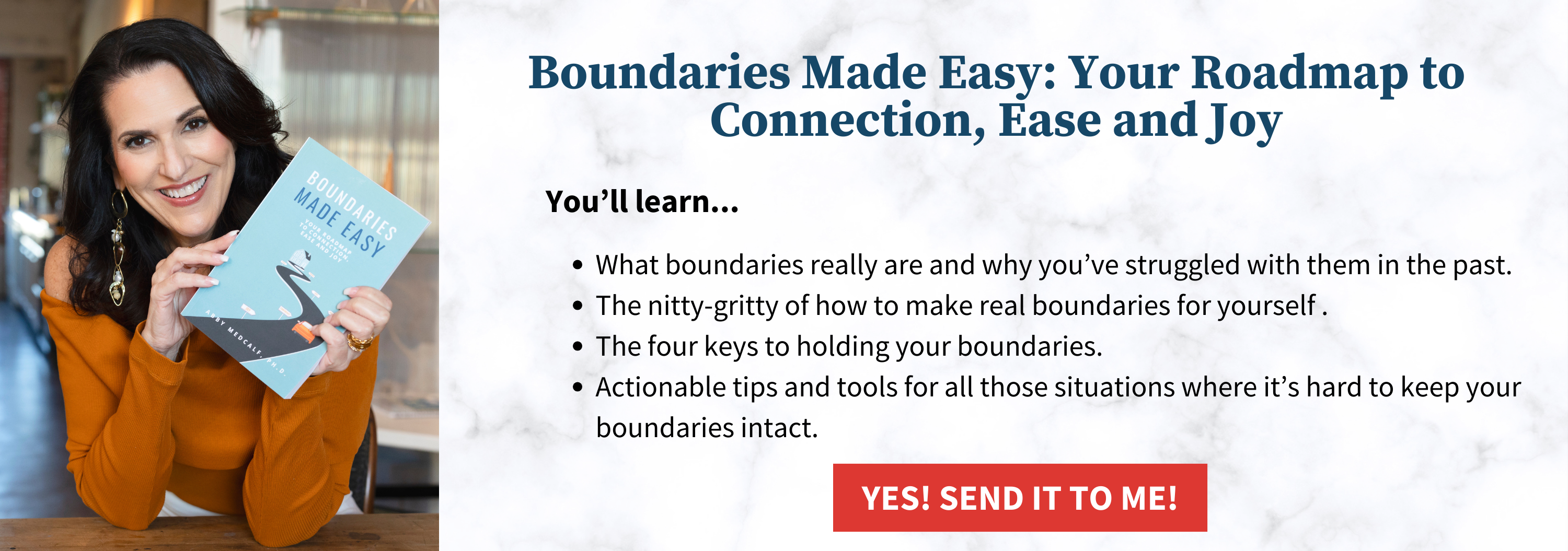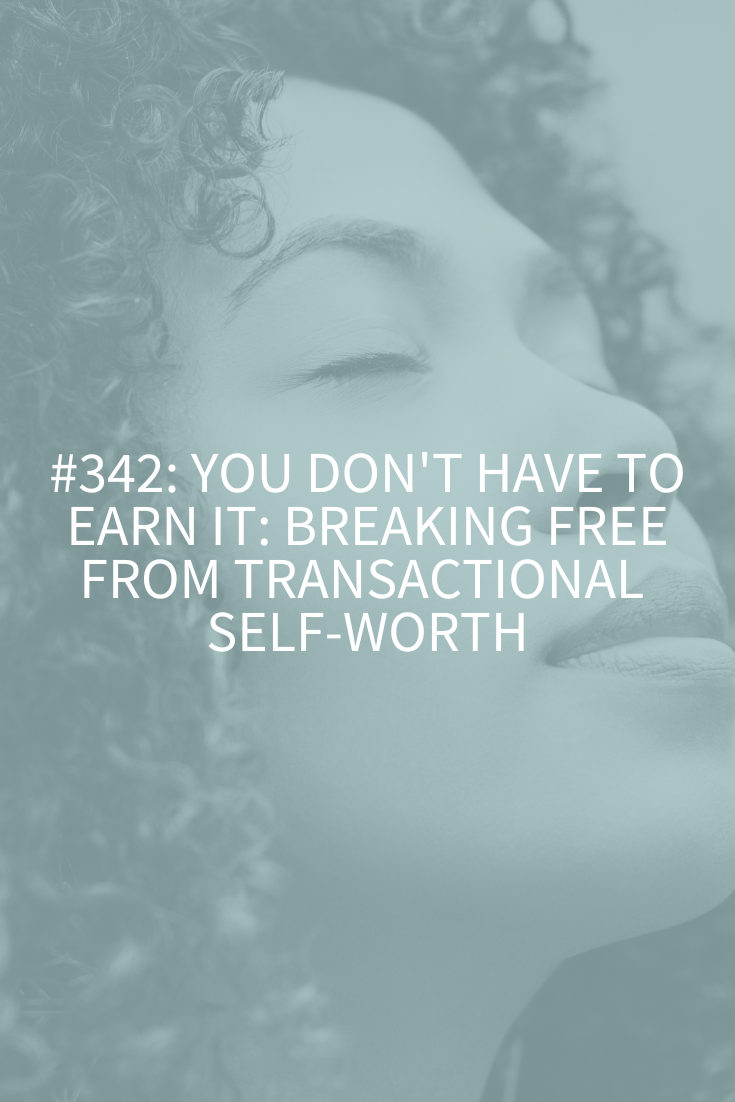
Parental or other familial estrangement is a real thing these days. And it’s more common than ever to block or cut off toxic friends or siblings. But is there a healthy way to cut people off so you can feel at peace with your decision and life? The short answer is, “Yes,” but you need to know the dos and don’ts. Today I’m coming at you with the three big mistakes people make when they’re cutting someone off and my five strategies for how to create healthier separations so you can find calm and ease in your relationships, even the ones you don’t keep anymore.
13-minute read
Disclaimer: Before we jump in, I want to be clear that I cannot speak here to all situations. At the end of the day, you need to decide what’s best for you and I promise, you’ll get no judgment from me. If speaking to a particular person traumatizes or re-traumatizes you and you feel like there’s no other choice but to cut them off, then trust your gut and do that. I’m behind you 100%.
Introduction
But having said that, I can tell you that I’ve noticed a rash of cutting people off, and I don’t think it’s as healthy as we’d hoped. In some ways, people are finally taking back some power and realizing that it’s not just OK, but amazing, to stop allowing others to treat us poorly! My worry, however, is that the pendulum is swinging too far in that direction. Now that the door is open, I think too many people are walking through it without trying healthier options first.
And why is this important? Because, in my experience, if you don’t cut people off in a healthy way, you’ll keep attracting those types of relationships because you haven’t learned the skills you need to co-create healthier relationships! And worse yet, you’ll cut someone off but still feel resentment or triggered when their name is mentioned. This is no way to live. Before we get too deep, let’s talk about these big mistakes I see people make when they cut people out of their lives, and then we’ll get to those five strategies.
The Mistakes You’re Making When You Cut People Off
Mistake #1: You think you’ve set boundaries, but you really haven’t
The most common reason I hear for wanting to cut people off is that they don’t respect your boundaries. A client will tell me, “I’ve told them for years that I don’t like how they’re treating me and they need to stop, but they just keep going back to old behaviors. I’m sick of it, so I’m cutting them off. I have no choice.”
The problem is that telling someone that you don’t like what they’re doing or asking someone to stop treating you a certain way isn’t a boundary! I go deep into how to create (and stick to) real boundaries in my last book, Boundaries Made Easy: Your Roadmap to Connection, Ease and Joy but I’m going to give you a quick lesson right now.
A real boundary has your standard clearly stated (“I’m not OK with you raising your voice when you speak to me”) but is then followed with what you’re going to do if it continues (“So I’m going to leave the room if you can’t speak to me calmly”). And then you have to follow through on what you said you’d do! It’s not someone else’s job to keep your boundary. That’s your job.
Learn how to set and hold loving boundaries. Pick up a copy of my new book, Boundaries Made Easy: Your Roadmap to Connection, Ease and Joy on Amazon. Get the print, eBook or audiobook today!
Mistake #2: You’re still full of anger and resentment
Relationships are all about feelings. If you’re not in a relationship with someone, you don’t have any feelings generally. I live in a busy city and pass by hundreds of people per day who I have no feelings about. In fact, I don’t give them a second thought because I’m not in any kind of relationship with them.
Cutting people out means the toxic relationship stops, but if you’re still resentful and angry, you’re still “in relationship” with them. They still have some hold or control over you. If you really want this person out of your life, it means you’ve got to find true loving detachment and peace with this person. If you cut people off, you should be left with neutral or love-based emotions only.
Get my 3 Steps to Understanding Loving Detachment and Learning How to Do It Consistently
Mistake #3: You want to cut off sympathy, not empathy
And this brings me to mistake #3 which is shifting from sympathy to empathy with this person you’re cutting off. I find that the anger and resentment stay because you can’t find any empathy for this other person, so you stay connected in this negative way.
This happens because people easily confuse sympathy and empathy. When we feel sympathy for someone, we want to do for that person. If your best friend’s dad dies, you get into doing mode. Do you need anything? Can I bring something over? You’re leaning into the other person’s needs. Often, in an unhealthy or toxic relationship, you’ve done this for too long! You worried about how they’d react to something or wondered how to say something so they’d “get it.”
With empathy, we connect with the feeling the other person might be having, not the situation. You don’t do anything to fix or please the other person! In other words, you see your mom coming after you about how you’re parenting (again), and you see that she’s feeling out of control, or maybe useless in her life or threatened or whatever else. It doesn’t mean you agree that she should be feeling this way or acting so horribly with you as she criticizes your parenting. It means you can relate to times you felt hopeless or irrelevant or to a time you were completely un-self-aware and have compassion for where she’s at.
You would then be very clear and hold your boundaries with her. “Mom, I’ve told you before that commenting on my parenting in any way is unacceptable, so we’ll be leaving now, and we can maybe try again another time.” And then you need to leave!
Healthy Things to Do Before Cutting People Off
When you cut people off, you’re employing the thickest boundary you can make. This person no longer has the privilege of interacting with you in any way. Never speaking to someone again and declaring that boundary is not something I recommend as a first option unless you are in a situation where you believe you’re being abused physically, mentally or emotionally.
When you stop speaking to someone altogether, you’re not working on your boundary. You’re not learning to hold your boundaries when it gets hard and, as I’ve said, you’ll likely keep getting into these kinds of relationships because you haven’t learned the skill set you need to keep yourself safe.
When you make a big proclamation or announcement that someone is cut off or when you block them on your phone or social media, you’re drawing a huge line in the sand. In my experience, this results in you eventually allowing this person back in your life again because you feel “mean” or “guilty” (there’s that sympathy over empathy) or because it’s just not possible to never speak to them again! For example, if your brother is the one who always tramples your boundaries, you might quickly realize you can’t cut him off because he’s going to be at all the holiday dinners for the rest of your life so you’re going to have to see him if you want to keep attending yourself.
What I want you to do first is practice those boundaries. Here are some strategies my clients have found highly successful over the years when they feel they need to draw thicker boundaries but not formally cut people off.
Strategy #1: Be specific with what you share.
Instead of never speaking to this person again, stop sharing anything personal. You get into trouble because you’re trusting this person with private information and they use it against you, criticize you, or maybe even gossip about you. Whatever the reason, stop giving this person ammunition. Instead, when you’re in a calm headspace, make a list of the safe topics you can discuss and do not stray from those subjects!
I’ve shared many times on my Relationships Made Easy podcast the issues I had with my mom, who had narcissistic personality disorder. I didn’t want to cut her off for many reasons, but there were many years I struggled until I figured out how to set and hold my boundaries with her. I used this tool relentlessly and found my peace with her.
For me, I would speak to her only about my work and my kids’ sports or anything they were doing musically. Are you seeing how specific that is? When Max was having trouble in school, I didn’t let her know. When Macartney fell off her bike, knocked out her tooth, and needed multiple stitches, I didn’t let her know. Why? Because these were dangerous areas for me. These were areas where I already felt vulnerable and worried, so sharing it with her would have been disastrous for me as I dealt with her judgment and criticism (all in the form of her “I’m just trying to help” suggestions).
Instead, I’d keep notes in my phone (really) of accomplishments the kids had or funny things that happened with the dog and share those with her when we spoke. “Macartney just got approved to pitch on her softball team,” “Max is switching from outfield to catcher,” or “Macartney just learned a new song on the guitar.” Or maybe I’d chat about my work, “I just finished the season for my podcast. I was surprised how popular the episode on loving detachment was!”
We would (surprisingly?) have great conversations about these topics. When she’d inevitably ask about my relationship with Gary, I’d say, “He’s great! Nothing really to report there.” Or I might say, “He’s great. Work is going well, and his softball team actually won a game the other night!”
Sometimes she’d come back (especially in the beginning) with some hopeful hook, “But how are the two of you really doing? It can’t be great all the time.” And I would respond in my most cheerful voice, “I don’t know what to tell you, all is well, and I’m happy.”
Although I kept our topics relatively shallow, I did my best to try to connect with love, patience and compassion. And that’s how we really connect with others: with feelings, not content. When you’re on the defensive in any conversation, you’re not connecting because you’re coming from fear. I know it sounds crazy, but I never felt closer to my mother than I did when I started having these thicker boundaries in what I shared. I’m grateful to say that, when she died, I felt quite loving towards her, something I never thought I could achieve. By taking out the “hot topics,” I was able to be more relaxed, playful and compassionate with her. Remember, we connect with feelings, not thoughts. It’s not about what you share, it’s about your loving intent.
Strategy #2: Shift the conversation.
If the other person simply won’t stop talking about your weight or gossiping about your sister, my fail-safe response is: “There are so many things I’d love to talk about with you, and this isn’t one of them” or “There are so many things I’m really excited about in my life right now that I’d love to chat with you about instead.” And then I’d swiftly change to that topic. This one is a game-changer! Do this with your most light-hearted and loving voice and you’ll find that the other person will easily be led to something else you can (hopefully) connect on.
When all else fails, simply asking the other person questions about their life is a great way to shift the conversation. People love to talk about themselves, and you can think to yourself, “When I speak to my brother, I’m only going to listen and attempt to connect that way.” Don’t think about a reciprocal relationship; think about one that works for you as you keep this person in your life with a thicker boundary.
Strategy #3: Get yourself into a good head space first.
If there’s someone in your life you’re ready to cut off, you likely feel very angry with them. When you think of them or see their name pop up on your phone, all those feelings of helplessness, resentment and frustration likely rise straight to the top. If you try to speak with someone or respond to a text or post from this place, it’s going to be bad for you because it’s very hard to hold your boundaries when fear hijacks your brain.
I want you to get in the habit of always pausing before responding to anyone you’re struggling with. You can say, “I’ll get back to you” if it’s in the moment, but if it’s not (as in they’re calling, texting, emailing or posting), you need to consistently wait until you can gather yourself into a more centered, love-based headspace, before responding.
One of my favorite hacks for this is to change the person’s name in your phone. So, when my mom called me, “breathe” would show up because that’s what I named her in my contacts. I had a client who had a difficult mother-in-law, so he re-named her “Mothra” in his phone (he used to watch the old Godzilla movies when he was a kid, and Mothra always made him smile). Seeing the person’s name like this is a quick way to shift from autopilot into conscious thoughtfulness when it comes to interacting with this person.
When my mom would call me, I wouldn’t answer the phone, no matter what. It was never a good idea for me to speak to her on the fly because it was harder to hold (or even remember my boundaries). Instead, I’d take a beat, bring myself to a calm, loving place, and then return the call. Sometimes this meant calling her right back, and other times it meant calling in a few days.
Strategy #4: Let them go gently.
I have a client who has some older college friendships that aren’t working for her anymore, but she feels at a loss for how to let these friendships go without making a big pronouncement. These are times when I tell my clients to let go gently. First and foremost, don’t be the person to reach out, ever. If the other person complains about this, either ignore it or let them know this is the best you can do right now. Don’t argue with them or be cajoled. This is your boundary right now.
When they do contact you (whether by text or call), you can text back with something easy and generic such as, “All is great here. Busy as usual with work and kids. Hope all is well there too.” You’re still responding, but not with any real information. Do not respond with a question that prolongs the conversation such as, “Feeling great, how are things with you?” Do not call back, even if they called. Text or email is your friend when letting go of relationships.
If you’re invited to things, let the other person know you can’t make it but don’t get into the reasons why. You can also do this slowly by attending less things over time until you “wean” yourself out of their life and invitations. You don’t need to “unfollow” or “block” them on social media, but stop engaging with their posts or comments.
In the meantime, go out there and find your peeps! Join a book club, take a yoga class in person instead of online, go into the office more to work, try working at a local café once a week, take your kids to a different park, join a parenting group, volunteer at your kid’s school, or start attending church, mosque or temple. You won’t be able to make new friends if you aren’t out in the world meeting people, and it’s going to be much easier to let go of unhealthy people in your life if you’ve got new, healthier ones in place.
Strategy #5: Learn to create healthy boundaries.
As I said earlier, you’ll continue to get into unhealthy situations with people if you don’t learn the skill of boundary-setting. There are tons of free resources here on the website or you can learn all the nitty-gritty steps in my latest book, Boundaries Made Easy: Your Roadmap to Connection, Ease and Joy.
The last thing I want to say about cutting people off is this: If you try using these tools and techniques and still find that you can’t keep your boundaries with someone, it might be time to cut them off completely. Do not put yourself in abusive situations, ever, and if the only way to keep yourself safe is to remove them from your life, then it might be time to do just that.
Resources for Is There a Healthy Way to Cut People Off?
Three Steps to Loving Detachment
Empathy in Relationships Is the Key to Connection and Communication
Boundaries Resources on AbbyMedcalf.com
The #1 Reason Why You Don’t Hold Your Boundaries
Boundaries Made Easy: Your Roadmap to Connection, Ease and Joy by Dr. Abby Medcalf







